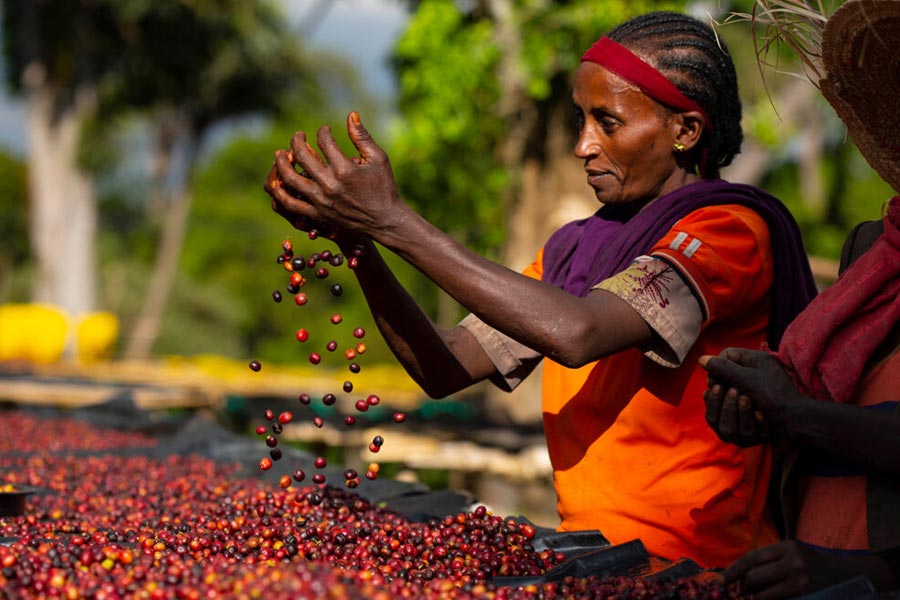
Commentaries | Jul 22,2023
Jul 1 , 2023
By Nouriel Roubini
With the world navigating an uncertain economic landscape, countries are faced with four possible scenarios: soft, softish, and hard landings, if not de-anchoring of inflation. The Eurozone is already in a technical recession, and growth has slowed sharply in the UK and US, with high inflation remaining a challenge, argued Nouriel Roubini, a professor emeritus of Economics at New York University's Stern School of Business, in this commentary provided by Project Syndicate (PS).
There are currently four scenarios for the global economic outlook. Three of these entail potentially serious risks with far-reaching implications for markets.
The most positive is a "soft landing," where central banks in the advanced economies manage to bring inflation back down to their two percent targets without triggering a recession. There is also the possibility of a softish landing. Here the inflation target is achieved but through a relatively mild (short and shallow) recession.
The third scenario is a hard landing, where returning to two percent inflation requires a protracted recession with potentially severe financial instability (such as more bank distress and highly leveraged agents suffering serious debt-servicing difficulties). If the effort to tame inflation triggers severe economic and financial instability, a fourth scenario becomes possible: central banks wimp out and decide to allow for above-target inflation, risking a de-anchoring of inflation expectations and a persistent wage-price spiral.
As matters stand, the eurozone is already in a technical recession, with GDP having fallen in the fourth quarter of last year and the first quarter of this year, and with inflation still well above target (despite its recent decline). The United Kingdom is not yet in a recession, but growth has slowed sharply, and inflation remains stubbornly high (above the OECD average). And the United States suffered a sharp slowdown in the first quarter even as core inflation (which excludes food and energy prices) remained high (though it is falling, it remains above five percent).
Meanwhile, China's post-COVID recovery seems to have stalled, calling into question the government's relatively modest five percent growth target for 2023. And other emerging-market and frontier economies are exhibiting relatively anaemic growth relative to their potential (with the exception of India), with many still suffering from very high inflation.
Which of the four scenarios is most likely?
Although inflation has fallen in most advanced economies, it has not done so as fast as central banks hoped, partly because labour-market tightness and rapid wage growth have added to the inflationary pressure in labour-intensive services sectors. Moreover, expansionary fiscal policies are still feeding demand and contributing to the persistence of inflation.
This has made it more difficult for central banks to fulfil their price-stability mandate. Market expectations that central banks were done with interest-rate hikes and would even begin to cut rates in the second half of this year have been dashed. The US Federal Reserve, the European Central Bank, the Bank of England, and most other major central banks will have to raise rates even more before they can pause. As they do, the economic slowdown will become more persistent, raising the risk of an economic contraction and new debt and banking stresses.
At the same time, geopolitical developments – some of which come out of the blue, like the Wagner Group's abortive march on Moscow – continue to push the world toward instability, deglobalization, and greater fragmentation. And now that China's recovery is losing steam, it must either pursue aggressive stimulus policies – with implications for inflation globally – or risk significantly undershooting its growth target.
On the positive side, the risk of a severe credit crunch has declined since the banking failures in March, and some commodity prices have softened (partly owing to expectations of a recession), helping to temper goods inflation. The risk of a hard landing (scenario three), therefore, appears lower than it was a few months ago. But with stubbornly high wage growth and core inflation forcing central banks to make additional rate hikes, a short and shallow recession over the next year (scenario two) has become much more likely.
Worse, if a mild recession does materialize, it may further erode consumer and business sentiment, thus creating the conditions for a more severe and protracted downturn and adding to the risk of financial and credit stress. Faced with the possibility of the second scenario evolving into the third, central banks might blink and allow inflation to remain well above target, rather than risk triggering a severe economic and financial crisis.
Thus, the monetary-policy trilemma of the early 2020s remains. Central banks face the exceedingly difficult task of achieving price stability, growth stability (no recession), and financial stability simultaneously.
What are the implications for asset prices in these scenarios?
So far, the US and global equities have reversed their 2022 bear market, and bond yields have moved slightly lower – a pattern that is consistent with a soft landing for the world economy, where inflation falls toward the target rate and a growth contraction is avoided. Moreover, US equities – mostly tech stocks – have been bolstered by the hype around generative artificial intelligence.
But even a short and shallow recession – let alone a hard landing – would cause significant declines in US and global equities. And if central banks were then to blink, the resulting increase in inflation expectations would drive up long-term bond yields and eventually hurt stock prices, owing to the higher discount factor that would be applied to dividends.
While a severe hurricane for the global economy looks less likely than it did a few months ago, we are still likely to encounter a tropical storm that could cause significant economic and financial damage.
PUBLISHED ON
Jul 01,2023 [ VOL
24 , NO
1209]


Commentaries | Jul 22,2023

Viewpoints | Jul 24,2021

Viewpoints | May 31,2025

Commentaries | Apr 17,2020

Commentaries | Feb 03,2024

Fortune News | Feb 17,2024

Commentaries | Dec 07,2024

Commentaries | Feb 24,2024

Commentaries | Jun 07,2025

Commentaries | Mar 18,2023

Photo Gallery | 180586 Views | May 06,2019

Photo Gallery | 170781 Views | Apr 26,2019

Photo Gallery | 161859 Views | Oct 06,2021

My Opinion | 137296 Views | Aug 14,2021

Dec 22 , 2024 . By TIZITA SHEWAFERAW
Charged with transforming colossal state-owned enterprises into modern and competitiv...

Aug 18 , 2024 . By AKSAH ITALO
Although predictable Yonas Zerihun's job in the ride-hailing service is not immune to...

Jul 28 , 2024 . By TIZITA SHEWAFERAW
Unhabitual, perhaps too many, Samuel Gebreyohannes, 38, used to occasionally enjoy a couple of beers at breakfast. However, he recently swit...

Jul 13 , 2024 . By AKSAH ITALO
Investors who rely on tractors, trucks, and field vehicles for commuting, transporting commodities, and f...

Nov 1 , 2025
The National Bank of Ethiopia (NBE) issued a statement two weeks ago that appeared to...

Oct 25 , 2025
The regulatory machinery is on overdrive. In only two years, no fewer than 35 new pro...

Oct 18 , 2025
The political establishment, notably the ruling party and its top brass, has become p...

Oct 11 , 2025
Ladislas Farago, a roving Associated Press (AP) correspondent, arrived in Ethiopia in...

Nov 2 , 2025
The National Bank of Ethiopia (NBE) has scrapped the credit-growth ceiling that had s...

Nov 2 , 2025 . By SURAFEL MULUGETA
The burgeoning data mining industry is struggling with mounting concerns following th...

Nov 2 , 2025 . By YITBAREK GETACHEW
Berhan Bank has chosen a different route in its pursuit of a new headquarters, opting for a transitional building instea...

Nov 2 , 2025 . By BEZAWIT HULUAGER
Nib International Bank S.C. has found itself at the epicentre of a severe governance...